
Focusing on long-term challenges, policy cycles, digital transformation, and fiscal and taxation policies, Guanghua professors shared their long-running research on the Chinese economy taking into account the outcomes of this year's Two Sessions.
LIU Qiao, Professor of Finance and Dean of the Guanghua School of Management, shared that maintaining high Total Factor Productivity (TFP) growth, achieving an industrial structure compatible with a modern economy, and the re-allocation of the labor force are among the various long-term structural challenges China's economy faces. Other challenges include complications from an aging population, pressures from urbanization, low investment efficiency, inadequate high-caliber R&D talent, and a consumption structure that needs to be optimized. He especially noted the sub-optimal distribution of urban populations as a key issue holding back housing and infrastructure investment efficiency. Professor LIU urged further reform and opening-up as the overall strategy needed to overcome these challenges, calling for the market to play a decisive role in resource allocation.
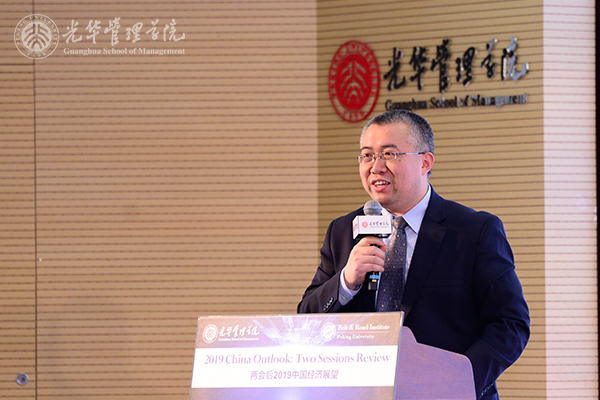
During his presentation entitled "A policy-driven medium-term boom," YAN Se, Associate Professor of Applied Economics and Deputy Director of Peking University’s National Center for Financial Research, said that economic cycles, financial cycles and policy cycles are the three crucial factors to examine when analyzing China's economy, with policy cycles driving economic and financial cycles. According to Yan, the Chinese economy’s slowing growth from last year is, to some extent, the intended result of China's policies, including efforts to de-leverage the economy and reduce infrastructure investment growth. As the country aims to achieve a moderately prosperous society by 2020, the top priority for the Chinese economy is to stabilize growth. Citing substantial tax cuts and a monetary policy that is "prudent" but no longer "neutral," Yan expects China's economy to embrace a medium-term boom that will last one or two years.
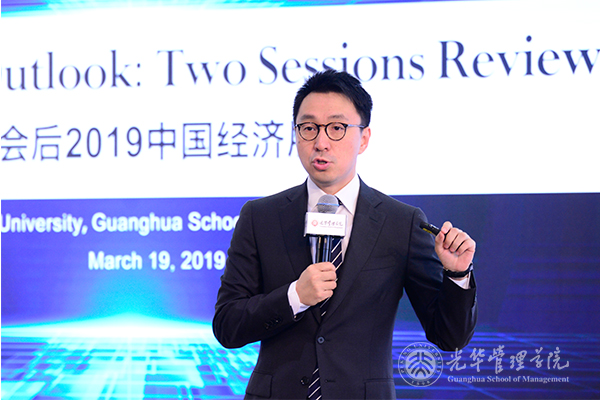
With the speed of growth slowing down after 40 years of rapid development, Guanghua Professor of Marketing and Associate Dean ZHANG Ying stressed digitalization as the new engine for growth, highlighting the role of digitalization in enhancing the country's position in the Global Value Chain as well as urbanization and technology-driven enhancement of production efficiency. According to Zhang, digitalization creates vast opportunities as consumption upgrading forces the supply side to transform and operate more efficiently, and digitalization will help further transform the Chinese economy into one that is innovation-driven. Also, as a means of increasing TFP, digitalization optimizes the allocation of resources, facilitates industry consolidation, while minimizing frictions and enhancing spatial effects. Zhang called for industrial upgrades in line with the development of the country's consumer Internet.
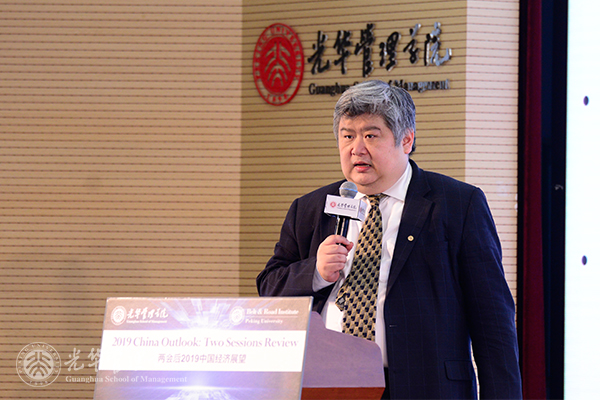
Focusing on promoting consumption growth, Guanghua Professor of Finance and Associate Dean JIN Li, noted that, with the weakening of the pulling effect of investment and exports to the economy, consumption is increasingly important to economic growth, and improving the consumption capacity of residents is a top priority. However, there is a mismatch between the willingness of low-income people to consume and their purchasing power. Jin called for the introduction of "negative income tax," which means the group with a total monthly income of less than 5,000 yuan should be rewarded with a certain proportion of their labor income so as to encourage their spending. He also stressed efforts to prevent fraud and errors in administration during implementation.
Gunnar Snorri Gunnarsson, Ambassador of Iceland to China, said he was particularly impressed with the long-term projections towards 2035 made by Professor Liu, especially issues resulting from an aging population and urbanization, which are problems that Iceland shares. He also hoped for more cooperation between Icelandic and Chinese universities.
"While we are here in China, we need more than official news and documents. It's always very useful to hear different aspects from professors and experts," said Ina Mar?iulionyt?, ambassador of Lithuania, calling the program "enlightening." She praised the professors for their full preparations and presentations full of valuable facts and figures.
With Lithuania being a leading European country in financial technology, she said it's interesting to hear predictions about the FinTech sector in China, as well as the cooperation the two countries can achieve through common goals.
Describing the program as a very good opportunity to learn about the development of China's economy, Myanmar's Ambassador U Thit Linn Ohn agreed with Professor Liu that challenges are also opportunities. He said that although different countries face different challenges, they can always explore new opportunities through cooperation. This is exactly what the Belt and Road Initiative enables them to do.
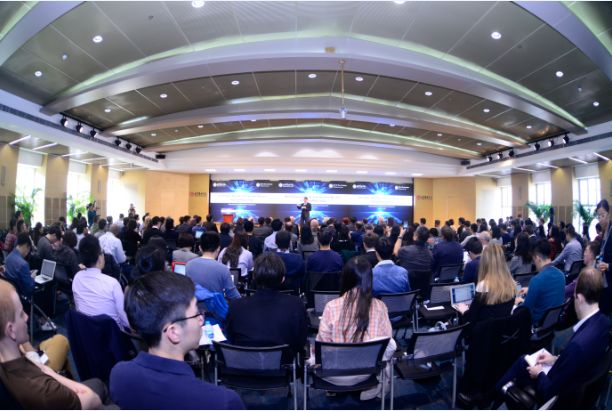
The March 19thevent was the fifth installment of the "Understanding China and the Belt & Road" lecture series hosted by Peking University’s Belt & Road Institute, and also marked the beginning of the second iteration of Guanghua’s Belt and Road Executive Program for Senior Diplomats, which will run until March 21.
The first high-level development program organized by the Belt & Road Institute, the Executive Program for Diplomats combines theories with real life cases to summarize the 40-year experiences of China's reform and opening-up for senior diplomatic officials from different backgrounds. It aims to tell Chinese stories objectively and thoroughly, share development ideas and highlight the opportunities for cooperation and a new type of globalization created by China’s Belt and Road Initiative.
Some 60 senior diplomats, including 14 ambassadors, were selected for the second round of the program, which feature a wide spectrum of courses on globalization, industrial and economic development zones, China's national strategic development plan, regional economy and urbanization, local governments in transition, and a case study on the Ningxia wine industry, among others. All levels of students from universities across Beijing, special guests from Chambers of Commerce, representatives from multinational corporations and leading media outlets also attended Tuesday's lecture.
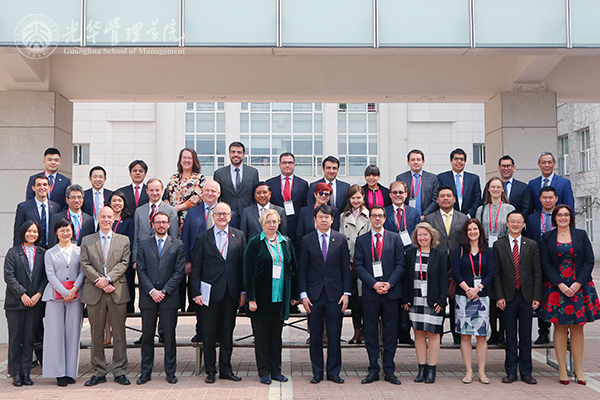
Rooted in Peking University's historic heritage, Guanghua’s professors utilize internationally accepted tools and methods to study cutting-edge issues related to the field of management and China’s economy.
In 2017, Guanghua launched its “Guanghua Thought Leadership Platform”, with the mission of promoting research that addresses critical and structural problems in public policy, documents and analyzes business practices in China, and contributes to industrial and national development. Under the guidance of Guanghua faculty, the results of research conducted through this platform is integrated into the School’s programs and curriculum.
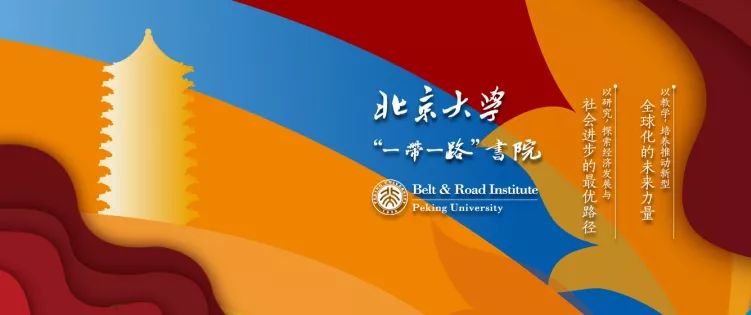
Peking University Belt & Road Institute Lecture Series: Understanding China and the Belt & Road
Peking University announced its new Belt and Road Institute in April 2018.The Belt and Road Institute is an international education and research platform administered through the Guanghua School of Management that promotes the exchange of ideas that promote human progress, drive inclusive development, and create solutions to global challenges by engaging with government officials, business elites and students across the world.
In addition to the March 19thevent, the Institute has already organized four other lectures as part of the "Understanding China and the Belt & Road" Lecture Series, inviting leading scholars, government officials and entrepreneurs to understand China's development from different perspectives and to Enhance young people's understanding of China's Belt and Road Initiative. Previous events have included a lecture by Guanghua's Dean LIU Qiao on corporate China; a lecture by Ning Jizhe, Deputy Director of the National Development and Reform Commission, on the implementation of the Belt and Road Initiative; a visit with executives from China construction giant Gezhouba; and a lecture by Associate Dean Zhou Li-An on local governments.
 Programs
Programs